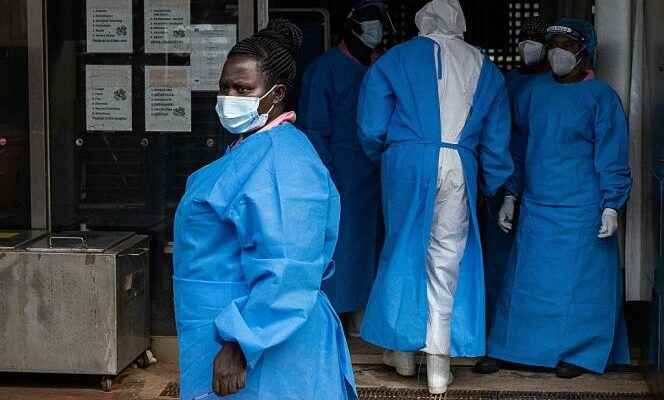To not miss any African news, subscribe to the newsletter of the “World Africa” from this link. Every Saturday at 6 a.m., find a week of news and debates covered by the editorial staff of the “World Africa”.
Greeted by a plainclothes policeman, a disinfectant spray in hand, Immaculate Atuhaire advances in front of the gate, her forms tight against her. “Two new people were intercepted by the police the day before, I have to record their information”, explains the epidemiologist, before entering the enclosure of the quarantine center for contact cases of Ebola fever. They are twenty-two here, in Madudu, a small village in Mubende district, Uganda. All from the same family, which has already lost six of its members to the virus.
Each in turn, the recluses take their temperature in front of the doctor, standing on the doorstep, and answer her questions about their state of health. “Normally, contact cases stay at home and are visited by surveillance teams until the end of the twenty-one-day incubation period, details Immaculate Atuhaire. But these people refused to cooperate, in particular by transporting the body of one of their deceased to be buried despite the risks. »
The authorities’ concern about the potential spread of the virus is all the more acute since two of its members traveled to Kampala, the capital, on October 6 under a false identity. One of them, a 45-year-old man, died there the next day. His wife, who gave birth a few days later in a clinic, is now being treated at a treatment center in Entebbe. The authorities have registered 48 contact cases linked to their trip to the capital. Those most at risk have been placed in isolation and the rest are monitored daily at home by health teams.
Faced with the risk of the epidemic spreading to the rest of the country, President Yoweri Museveni announced on Saturday October 15 the confinement of the districts most affected by the virus, Mubende and Kassanda, in central Uganda. For twenty-one days, entries and exits in these two localities are prohibited, a curfew is established from 7 p.m. and all transport, public or private, is prohibited. As with confinements during the Covid-19 epidemic period, places of worship, bars and sports halls are closed.
Monitor potential suspected cases
More than 1,500 contact cases of patients with the Sudanese strain of Ebola circulating in the country have been recorded nationally, including several dozen very far from the epicenter of the epidemic, in particular in Kampala, in the central region of Luweero, and to the east, in the district of Pallisa. “There are a lot of efforts on monitoring, underlines Nicolas Mouly, emergency response coordinator for Doctors Without Borders. Investigating around confirmed cases to find out their journey, whether they went through health centers, whether public, private or traditional, and finding contact persons and high-risk contacts is one of the top priorities for the next two weeks,” he continues.
You have 48.22% of this article left to read. The following is for subscribers only.
